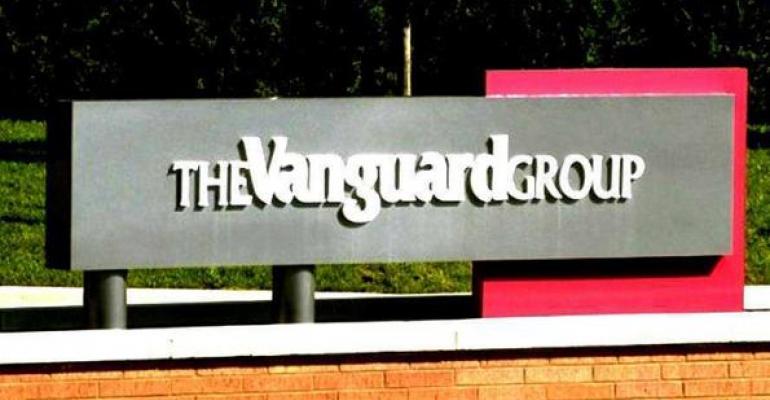Vanguard fired a shot across the bow of the big RIA custodial firms this summer when it announced it will eliminate commissions on most exchange traded funds, including many sold by its competitors.
The move followed a decision last year by TD Ameritrade to stop offering Vanguard’s ETFs on its own commission-free platform. That happened because Vanguard refused—as per its usual practice—to pay distribution fees for its funds.
Some industry pundits also have speculated that the Vanguard move could be the precursor to a re-entry by the firm into the custodial business—speculation that Vanguard denies.
But it could give a big boost to the firm’s fast-growing Vanguard Personal Advisor Services; commission-free ETFs could attract assets and customers that could then be converted to the firm’s advisory service.
In July, Vanguard announced that its decision to eliminate commissions on 1,720 ETFs. That creates a huge new marketplace for ETFs trading at no cost - far bigger than any of its rivals. Schwab offers 265 commission-free ETFs from 15 providers, and Fidelity offers 95. TD Ameritrade tripled the number of commission-free ETFs on its platform last October, now offering nearly 300.
“Vanguard has been very transparent for a long time that they won’t pay for eye-level shelf space on any third-party platform,” says Ben Johnson, director of global ETF research at Morningstar. “They’re practicing what they’re preaching here by allowing competitor products to do the same,” he adds. “Their message is that pay to play is not in best interest of investors, and it will create pressure on the other brokerage platforms.”
The big custodial firms note that they, too, have been expanding commission-free ETFs. And a TD Ameritrade spokesperson says the firm won’t be revisiting its earlier decision to sever the Vanguard relationship: “Clearly, the ETF marketplace is a highly competitive, evolving space, but we’re not planning to reverse last year’s changes. As we said last fall, free ETFs cost money. There are significant expenses that come with handling trades and servicing shareholders.”
Vanguard had a custodial business but exited the market in 2003. The new Vanguard ETF offering is retail-only, but the speculation about a re-entry is understandable since most ETF trading is done by professionals on behalf of clients.
Rich Powers, Vanguard’s head of ETF product management, says the company “has no intention” to re-enter the custodial business. “It’s a business that already has a large number of companies that have invested in the technology it takes to serve the market. We have to ask ourselves what the opportunity would be versus the cost, and how realistic it would be to make a meaningful stride there.”
Michael Kitces, publisher of the Nerd’s Eye View blog and a partner at Pinnacle Advisory Group, has followed the Vanguard ETF move closely, and he doesn’t expect the company to move back into the custodial space.
“It looks to me like Vanguard came up with a way to try to shatter the no-transaction-fee ETF platform revenue model without needing to come into the RIA custody business,” he says. “If Vanguard is successful at forcing RIA custodians to open up their platforms to Vanguard funds and ETFs, why would they need to come into the RIA custody business?”
He adds: “Vanguard doesn’t want or need to do the service-and-technology-intensive RIA custody layer, when it can let the actual RIA custodians do that work and just focus on its core fund/ETF business.”
But Vanguard’s ETF strategy does stand to benefit its VPAS, and it underscores the ongoing industry move toward making money not on investment product, but advice. VPAS already is a big success, managing $112 billion through June 30th, according to the company.Tiered management fees start at 30 basis points, with an average underlying portfolio cost is eight bps.
The ETF strategy provides Vanguard with a new way to attract retail assets and customers who can be pitched VPAS services. “Vanguard doesn’t need to make basis points on the ETF platform because it can make those on PAS,” notes Kitces, who discussed the move in a recent webinar.
Powers acknowledges that the ETF platform could boost usage of VPAS. But he adds that most VPAS clients now use mutual funds. “The system is configured with mutual funds in mind,” he says. “ETFs are a growing part of direct-retail, but it’s still relatively small.”
“We do think there are compelling reasons for some individual investors to take advantage of ETFs,” he adds. “For smaller investors, the cost of entry is just the share price, instead of the $3,000 minimum for mutual funds. And investors looking for more tactical options, ETFs are better.”
Bringing such a large number of competitor ETFs onto its own platform has one other benefit, Kitces thinks. “It reduces the fiduciary regulatory pressure on VPAS—no one can accuse them of being a Vanguard-proprietary-only platform now.
Vanguard has made no secret of its ambition to become the ubiquitous, low-cost, most convenient provider of financial services, much as Amazon has done with just about everything else. Amazon is well known for gaining market intelligence from sales patterns of third parties selling on its platform. Kitces thinks that could happen with Vanguard’s ETF strategy, too.
“This will give Vanguard direct market intelligence on what their investors hold that aren’t Vanguard funds or ETFs … so they know exactly what to launch next to capture market share. It’s win-win-win for them,” says Kitces.





